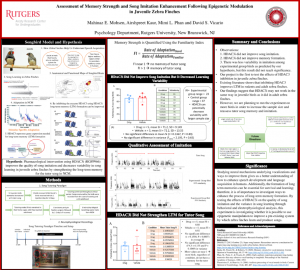Mohsen, Mahinaz: Assessment of Memory Strength and Song Imitation Enhancement Following Epigenetic Modulation in Juvenile Zebra Finches
Title: Assessment of Memory Strength and Song Imitation Enhancement Following Epigenetic Modulation in Juvenile Zebra Finches
Name: Mahinaz Mohsen
Major: Cell Biology and Neuroscience
School affiliation: School of Arts and Sciences
Programs: Aresty – Research or Conference Funding Recipient,Honors College Capstone
Other contributors: Mimi Phan, David Vicario, and Airshpreet Kaur
Abstract: As we navigate through our environment, we are constantly collecting, processing, and storing sensory information. Some of this information can be essential for our future survival and is encoded in neural systems as long-term memory. Our ability to form lasting memories about sensory information gained from experience requires de novo gene expression for neuroplasticity. A powerful influence on gene expression consists of epigenetic mechanisms that regulate stable changes in neural function, connectivity, and behavior. For example, histone acetylation usually promotes gene expression, while histone deacetylation represses gene expression. In my project, I am using an established animal model of vocal learning that depends on auditory processing and memory, the zebra finch (a songbird), to ask the following question: By modulating epigenetic mechanisms to strengthen memory, can we improve song imitation and decrease learning variability in juvenile zebra finches? More specifically, can an inhibitor of deacetylation enzyme HDAC3 in neurons (RGFP966) that increases gene expression in a certain area of the brain strengthen the bird’s memory of the tutor song and, subsequently, improve the fidelity of song imitation and decrease variability in song learning in juvenile zebra finches. The experiment has two major components: a behavioral song tutoring paradigm followed by electrophysiological recordings. Two groups of young birds were tutored; one received HDAC3 inhibitor (HDAC3i) and the other received vehicle. Song imitation was quantified using a similarity index and memory strength was quantified using a familiarity index. We found that HDAC3i did not strengthen long-term memory formation or improve song imitation and decrease variability in learning. However, the data suggest that HDAC3i has the potential to decrease variability in song learning in juvenile zebra finches because the range of similarity scores for the experimental group was narrower than that of the control group. Our results are not consistent with previous studies showing that HDAC3i improves long-term memory formation in adult zebra finches, suggesting that the effects of HDA3i on memory formation in juveniles could be different from those in adults. Moreover, we also found that 90% of the birds in this experiment, regardless of condition, did not have a neural memory for the tutor song in NCM (secondary auditory area in the avian brain) despite imitating the tutor song very well, which is inconsistent with a previous study that showed that better song imitation is strongly correlated to stronger tutor song memories in the NCM.
